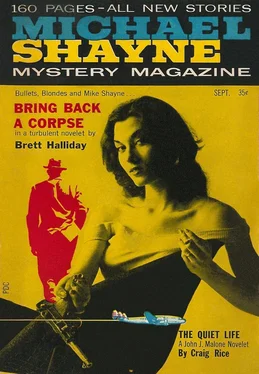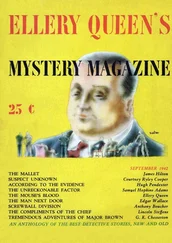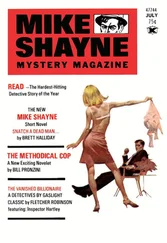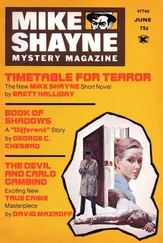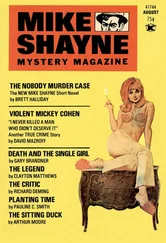Robert Bloch - Michael Shayne Mystery Magazine. Vol. 1, No. 1. September 1956
Здесь есть возможность читать онлайн «Robert Bloch - Michael Shayne Mystery Magazine. Vol. 1, No. 1. September 1956» весь текст электронной книги совершенно бесплатно (целиком полную версию без сокращений). В некоторых случаях можно слушать аудио, скачать через торрент в формате fb2 и присутствует краткое содержание. Город: New York, Год выпуска: 1956, Издательство: Renown Publications, Жанр: Детектив, на английском языке. Описание произведения, (предисловие) а так же отзывы посетителей доступны на портале библиотеки ЛибКат.
- Название:Michael Shayne Mystery Magazine. Vol. 1, No. 1. September 1956
- Автор:
- Издательство:Renown Publications
- Жанр:
- Год:1956
- Город:New York
- ISBN:нет данных
- Рейтинг книги:3 / 5. Голосов: 1
-
Избранное:Добавить в избранное
- Отзывы:
-
Ваша оценка:
- 60
- 1
- 2
- 3
- 4
- 5
Michael Shayne Mystery Magazine. Vol. 1, No. 1. September 1956: краткое содержание, описание и аннотация
Предлагаем к чтению аннотацию, описание, краткое содержание или предисловие (зависит от того, что написал сам автор книги «Michael Shayne Mystery Magazine. Vol. 1, No. 1. September 1956»). Если вы не нашли необходимую информацию о книге — напишите в комментариях, мы постараемся отыскать её.
Michael Shayne Mystery Magazine. Vol. 1, No. 1. September 1956 — читать онлайн бесплатно полную книгу (весь текст) целиком
Ниже представлен текст книги, разбитый по страницам. Система сохранения места последней прочитанной страницы, позволяет с удобством читать онлайн бесплатно книгу «Michael Shayne Mystery Magazine. Vol. 1, No. 1. September 1956», без необходимости каждый раз заново искать на чём Вы остановились. Поставьте закладку, и сможете в любой момент перейти на страницу, на которой закончили чтение.
Интервал:
Закладка:
He saw why, when he stepped out. The door of his apartment was open. Beyond it, he saw men obviously in authority, men in uniforms, men in plain clothes, even one man in white. Something unscheduled had occurred, and that alone spelled danger. But this was more than unusual — it was grim. Fright followed his first consternation, then panic, then dread.
Rigidly controlling himself, he walked through the small foyer of the apartment and halted in the middle of the living room. A uniformed police lieutenant looked at his suitcase, then at him. The lieutenant’s stare was sympathetic, but, at the same time, it openly and carefully studied his face.
“Mr. Brown?” he asked.
“Yes. What’s the matter?”
“Bad news, I’m afraid. It’s your wife.” The lieutenant paused, letting this register. Brown gave no reaction, except to put down his suitcase, then urgently and fearfully wait to hear more. “I’m Lieutenant Storber. Your wife is dead.”
Brown gave a stunned, disbelieving echo. “Bernice dead? She can’t be. What happened?”
The lieutenant made indirect reply with another question. “Did your wife have any reason to commit suicide, Mr. Brown?”
“Suicide?” Brown’s astonishment was a spontaneous, total denial of the idea. “That’s impossible. It’s silly. Why, she just bought another... No, it’s out of the question.”
“She just bought another what, Mr. Brown?” the lieutenant asked him gently.
Brown answered mechanically, but his features began to come apart. “Another cook-book. Would a person who did that ever think about...? It was a thick one, too.”
“We know. We found it in the kitchen.”
Brown’s knees seemed to become unfastened, and the lieutenant helped him as he sagged into the nearest chair.
“I tell you, there must be a mistake,” he insisted weakly. “You haven’t investigated thoroughly enough. You’ll have to look around some more. When did it happen? How?”
The lieutenant sighed, took out a notebook. An interne emerged from an adjoining room, one used as a lounge and library. Not seeing Brown, he spoke to two men in plain clothes who were giving the livingroom a cursory inspection.
“D.O.A.,” said the interne. “It looks to me like a stiff dose of cyanide in a cocktail, probably a sidecar. That’s up to the medical examiner’s office. But I’d say she drank it quick, and death was practically instantaneous. At a guess, it must have been six or seven hours ago. Around noon.”
The interne went out, and the lieutenant sighed, flipped open the note-book, found a pencil.
“That’s about it, Mr. Brown,” The perfunctory words were filled with commiseration. “We just got here, ourselves, following a telephone call from some woman, probably a friend or neighbor we haven’t yet located, and that’s what we found. Your wife in the next room, with one empty glass — hers! Out in the kitchen, where she must have mixed it, cyanide in the bottle of brandy. No sign of a visitor. Nothing disturbed, apparently. She left no note, which is a little unusual. But you’d be surprised, how often they don’t.”
“I don’t believe it,” Brown protested hotly. “She didn’t kill herself. She couldn’t. Never!”
The lieutenant sighed again, and his voice was soothing. “I know how you feel. But that’s the way it hits everybody, when it’s close to them. Because, if you realize a person is depressed and despondent, then something is done about it, more likely than not, and it never gets as far as this. There are other times a person gets into a suicidal frame of mind and doesn’t tell anybody. When that happens, naturally nobody believes it, at first.”
“I’ll never believe it,” said Brown firmly. “You’ve got to look into this. This is something else. It’s got to be.”
“Oh, don’t worry, we’ll dig into it,” the lieutenant assured him heartily, but without much personal conviction. “We won’t drop this until we’re completely satisfied. Now, where have you been this afternoon. Mr. Brown?”
Brown’s surprise was genuine. “Who — me?”
“Yes, you. We’ll begin with you. Where were you around twelve or one o’clock, for instance?”
“Having lunch in a restaurant in Philadelphia,” said Brown readily. He supplied the name of the place. “I was there for almost two hours. The waitress ought to remember me — she asked for a tip on the races, and I gave her Bold Magician. After that, I made several business calls at drugstores. My order book is in the car downstairs. It shows where I stopped.”
The lieutenant was nodding, making only the briefest of notes. In spite of his shock and grief, Brown realized that the schedule to which he had adhered so rigidly was indeed paying off, in a serious emergency. He had never anticipated an emergency quite so drastic and dreadful. But now that it was upon him, the plan was there, a safeguard against the exposure of his illegal marriages, against even the possibility of suspicion in this present trouble.
Local newspapers, the next day, carried three- and four-paragraph stories on inside pages about the apparently impulsive, macabre suicide of Mrs. Robert D. Brown. There were pictures of the twenty-eight-year-old Bernice. One caption read: Beauty Drinks Death Cocktail. Stories mentioned Mr. Brown, who had not been at home, as a salesman traveling for Glamor-Glo Cosmetics.
Bernice had two older sisters, one of them married. These, with the brother-in-law, helped Brown with the few arrangements that had to be made. The brother-in-law confided in Brown, and Lieutenant Storber.
“To tell you the truth, I’m not surprised. Bernice was always moody and different. Most people wouldn’t notice, but there were little things gave her away, to anyone who had his eyes open.”
She was buried on the third day, at a quiet service. Brown came back to the apartment afterward, but there was nothing for him to do. He made arrangements to have the furniture stored and to terminate his lease. Then he packed his personal suitcase. It was the third day. He was due in Hartford that evening, at seven o’clock. Lucille would be expecting him — as Raymond A. Brown, salesman for a firm that manufactured smokers’ accessories.
Brown felt better after the change-over. Lucille might have her faults, but, tactfully handled and ignoring her sudden outbursts of temper, she could also be a wonderful tonic for the nerves. Bruised and shaken as his were, after the last three days, he needed an influence that would restore his normal poise and self-confidence.
Therefore it was strange, and more than frightening, when he arrived at his modest, two-story Hartford home that evening, to find a police prowl car parked in front of it, along with others whose official look he knew too well. The newly familiar scene was only too familiar.
He felt that this was a motion picture he had seen before. He hadn’t liked it the first time, but now he was plunged, in a single moment, from uneasy disbelief to numb horror. This couldn’t be happening — not again — not to him. But it was happening. It didn’t help, for some reason it was only worse, much worse, that this time he knew all the lines by heart, including his own.
“Mr. Brown?”
“Yes. What’s the matter?”
“I’m afraid I have bad news for you, Mr. Brown. It’s your wife. I’m Lieutenant-detective Todd. Your wife is dead.”
“Lucille? Dead? She can’t be. It’s impossible. It’s silly. This whole thing is silly. What happened?”
“Did your wife have any reason for taking her own life, Mr. Brown?”
“Lucille kill herself? No — absolutely not. That’s out of the question.” Brown’s repudiation, this time, came from more than spontaneous grief. There was black suspicion behind it. “There’s no chance she committed suicide, Lieutenant. None!”
Читать дальшеИнтервал:
Закладка:
Похожие книги на «Michael Shayne Mystery Magazine. Vol. 1, No. 1. September 1956»
Представляем Вашему вниманию похожие книги на «Michael Shayne Mystery Magazine. Vol. 1, No. 1. September 1956» списком для выбора. Мы отобрали схожую по названию и смыслу литературу в надежде предоставить читателям больше вариантов отыскать новые, интересные, ещё непрочитанные произведения.
Обсуждение, отзывы о книге «Michael Shayne Mystery Magazine. Vol. 1, No. 1. September 1956» и просто собственные мнения читателей. Оставьте ваши комментарии, напишите, что Вы думаете о произведении, его смысле или главных героях. Укажите что конкретно понравилось, а что нет, и почему Вы так считаете.
